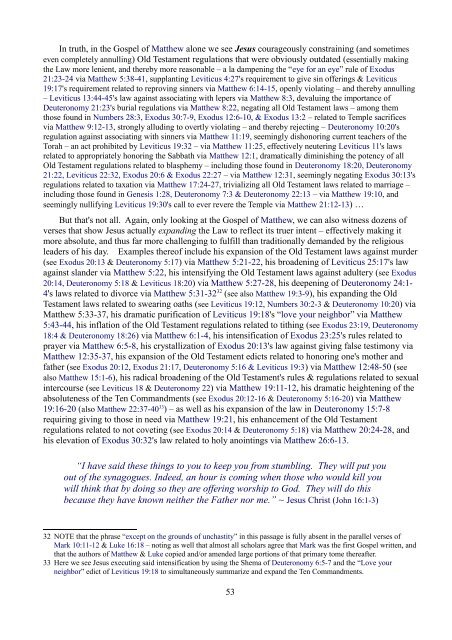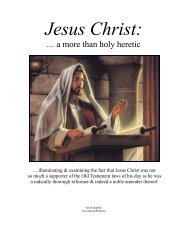The Cult of Paul
an exhaustive biblical examination of the starkly contrasting lives, values, & theologies of Jesus Christ and Paul -- Jesus' most zealous “apostle,” and the true father of the modern-day Christian church
an exhaustive biblical examination of the starkly contrasting lives, values, & theologies of Jesus Christ and Paul -- Jesus' most zealous “apostle,” and the true father of the modern-day Christian church
You also want an ePaper? Increase the reach of your titles
YUMPU automatically turns print PDFs into web optimized ePapers that Google loves.
In truth, in the Gospel <strong>of</strong> Matthew alone we see Jesus courageously constraining (and sometimes<br />
even completely annulling) Old Testament regulations that were obviously outdated (essentially making<br />
the Law more lenient, and thereby more reasonable – a la dampening the “eye for an eye” rule <strong>of</strong> Exodus<br />
21:23-24 via Matthew 5:38-41, supplanting Leviticus 4:27's requirement to give sin <strong>of</strong>ferings & Leviticus<br />
19:17's requirement related to reproving sinners via Matthew 6:14-15, openly violating – and thereby annulling<br />
– Leviticus 13:44-45's law against associating with lepers via Matthew 8:3, devaluing the importance <strong>of</strong><br />
Deuteronomy 21:23's burial regulations via Matthew 8:22, negating all Old Testament laws – among them<br />
those found in Numbers 28:3, Exodus 30:7-9, Exodus 12:6-10, & Exodus 13:2 – related to Temple sacrifices<br />
via Matthew 9:12-13, strongly alluding to overtly violating – and thereby rejecting – Deuteronomy 10:20's<br />
regulation against associating with sinners via Matthew 11:19, seemingly dishonoring current teachers <strong>of</strong> the<br />
Torah – an act prohibited by Leviticus 19:32 – via Matthew 11:25, effectively neutering Leviticus 11's laws<br />
related to appropriately honoring the Sabbath via Matthew 12:1, dramatically diminishing the potency <strong>of</strong> all<br />
Old Testament regulations related to blasphemy – including those found in Deuteronomy 18:20, Deuteronomy<br />
21:22, Leviticus 22:32, Exodus 20:6 & Exodus 22:27 – via Matthew 12:31, seemingly negating Exodus 30:13's<br />
regulations related to taxation via Matthew 17:24-27, trivializing all Old Testament laws related to marriage –<br />
including those found in Genesis 1:28, Deuteronomy 7:3 & Deuteronomy 22:13 – via Matthew 19:10, and<br />
seemingly nullifying Leviticus 19:30's call to ever revere the Temple via Matthew 21:12-13) …<br />
But that's not all. Again, only looking at the Gospel <strong>of</strong> Matthew, we can also witness dozens <strong>of</strong><br />
verses that show Jesus actually expanding the Law to reflect its truer intent – effectively making it<br />
more absolute, and thus far more challenging to fulfill than traditionally demanded by the religious<br />
leaders <strong>of</strong> his day. Examples there<strong>of</strong> include his expansion <strong>of</strong> the Old Testament laws against murder<br />
(see Exodus 20:13 & Deuteronomy 5:17) via Matthew 5:21-22, his broadening <strong>of</strong> Leviticus 25:17's law<br />
against slander via Matthew 5:22, his intensifying the Old Testament laws against adultery (see Exodus<br />
20:14, Deuteronomy 5:18 & Leviticus 18:20) via Matthew 5:27-28, his deepening <strong>of</strong> Deuteronomy 24:1-<br />
4's laws related to divorce via Matthew 5:31-32 32 (see also Matthew 19:3-9), his expanding the Old<br />
Testament laws related to swearing oaths (see Leviticus 19:12, Numbers 30:2-3 & Deuteronomy 10:20) via<br />
Matthew 5:33-37, his dramatic purification <strong>of</strong> Leviticus 19:18's “love your neighbor” via Matthew<br />
5:43-44, his inflation <strong>of</strong> the Old Testament regulations related to tithing (see Exodus 23:19, Deuteronomy<br />
18:4 & Deuteronomy 18:26) via Matthew 6:1-4, his intensification <strong>of</strong> Exodus 23:25's rules related to<br />
prayer via Matthew 6:5-8, his crystallization <strong>of</strong> Exodus 20:13's law against giving false testimony via<br />
Matthew 12:35-37, his expansion <strong>of</strong> the Old Testament edicts related to honoring one's mother and<br />
father (see Exodus 20:12, Exodus 21:17, Deuteronomy 5:16 & Leviticus 19:3) via Matthew 12:48-50 (see<br />
also Matthew 15:1-6), his radical broadening <strong>of</strong> the Old Testament's rules & regulations related to sexual<br />
intercourse (see Leviticus 18 & Deuteronomy 22) via Matthew 19:11-12, his dramatic heightening <strong>of</strong> the<br />
absoluteness <strong>of</strong> the Ten Commandments (see Exodus 20:12-16 & Deuteronomy 5:16-20) via Matthew<br />
19:16-20 (also Matthew 22:37-40 33 ) – as well as his expansion <strong>of</strong> the law in Deuteronomy 15:7-8<br />
requiring giving to those in need via Matthew 19:21, his enhancement <strong>of</strong> the Old Testament<br />
regulations related to not coveting (see Exodus 20:14 & Deuteronomy 5:18) via Matthew 20:24-28, and<br />
his elevation <strong>of</strong> Exodus 30:32's law related to holy anointings via Matthew 26:6-13.<br />
“I have said these things to you to keep you from stumbling. <strong>The</strong>y will put you<br />
out <strong>of</strong> the synagogues. Indeed, an hour is coming when those who would kill you<br />
will think that by doing so they are <strong>of</strong>fering worship to God. <strong>The</strong>y will do this<br />
because they have known neither the Father nor me.” ~ Jesus Christ (John 16:1-3)<br />
32 NOTE that the phrase “except on the grounds <strong>of</strong> unchastity” in this passage is fully absent in the parallel verses <strong>of</strong><br />
Mark 10:11-12 & Luke 16:18 – noting as well that almost all scholars agree that Mark was the first Gospel written, and<br />
that the authors <strong>of</strong> Matthew & Luke copied and/or amended large portions <strong>of</strong> that primary tome thereafter.<br />
33 Here we see Jesus executing said intensification by using the Shema <strong>of</strong> Deuteronomy 6:5-7 and the “Love your<br />
neighbor” edict <strong>of</strong> Leviticus 19:18 to simultaneously summarize and expand the Ten Commandments.<br />
53

















